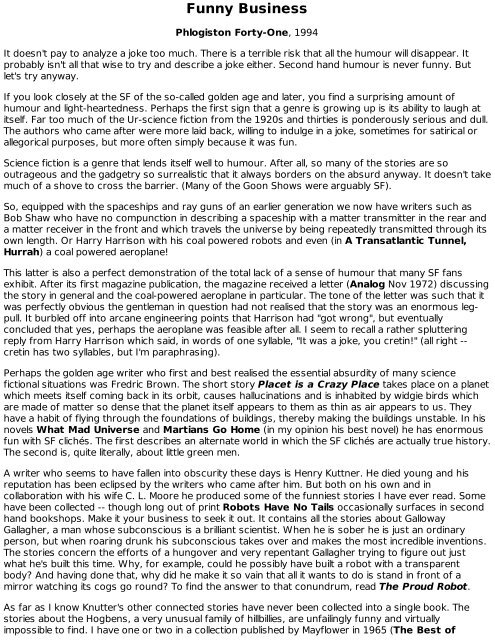Triffids Beard 2 - The Bearded Triffid
Triffids Beard 2 - The Bearded Triffid
Triffids Beard 2 - The Bearded Triffid
You also want an ePaper? Increase the reach of your titles
YUMPU automatically turns print PDFs into web optimized ePapers that Google loves.
Funny Business<br />
Phlogiston Forty-One, 1994<br />
It doesn't pay to analyze a joke too much. <strong>The</strong>re is a terrible risk that all the humour will disappear. It<br />
probably isn't all that wise to try and describe a joke either. Second hand humour is never funny. But<br />
let's try anyway.<br />
If you look closely at the SF of the so-called golden age and later, you find a surprising amount of<br />
humour and light-heartedness. Perhaps the first sign that a genre is growing up is its ability to laugh at<br />
itself. Far too much of the Ur-science fiction from the 1920s and thirties is ponderously serious and dull.<br />
<strong>The</strong> authors who came after were more laid back, willing to indulge in a joke, sometimes for satirical or<br />
allegorical purposes, but more often simply because it was fun.<br />
Science fiction is a genre that lends itself well to humour. After all, so many of the stories are so<br />
outrageous and the gadgetry so surrealistic that it always borders on the absurd anyway. It doesn't take<br />
much of a shove to cross the barrier. (Many of the Goon Shows were arguably SF).<br />
So, equipped with the spaceships and ray guns of an earlier generation we now have writers such as<br />
Bob Shaw who have no compunction in describing a spaceship with a matter transmitter in the rear and<br />
a matter receiver in the front and which travels the universe by being repeatedly transmitted through its<br />
own length. Or Harry Harrison with his coal powered robots and even (in A Transatlantic Tunnel,<br />
Hurrah) a coal powered aeroplane!<br />
This latter is also a perfect demonstration of the total lack of a sense of humour that many SF fans<br />
exhibit. After its first magazine publication, the magazine received a letter (Analog Nov 1972) discussing<br />
the story in general and the coal-powered aeroplane in particular. <strong>The</strong> tone of the letter was such that it<br />
was perfectly obvious the gentleman in question had not realised that the story was an enormous legpull.<br />
It burbled off into arcane engineering points that Harrison had "got wrong", but eventually<br />
concluded that yes, perhaps the aeroplane was feasible after all. I seem to recall a rather spluttering<br />
reply from Harry Harrison which said, in words of one syllable, "It was a joke, you cretin!" (all right -cretin<br />
has two syllables, but I'm paraphrasing).<br />
Perhaps the golden age writer who first and best realised the essential absurdity of many science<br />
fictional situations was Fredric Brown. <strong>The</strong> short story Placet is a Crazy Place takes place on a planet<br />
which meets itself coming back in its orbit, causes hallucinations and is inhabited by widgie birds which<br />
are made of matter so dense that the planet itself appears to them as thin as air appears to us. <strong>The</strong>y<br />
have a habit of flying through the foundations of buildings, thereby making the buildings unstable. In his<br />
novels What Mad Universe and Martians Go Home (in my opinion his best novel) he has enormous<br />
fun with SF clichés. <strong>The</strong> first describes an alternate world in which the SF clichés are actually true history.<br />
<strong>The</strong> second is, quite literally, about little green men.<br />
A writer who seems to have fallen into obscurity these days is Henry Kuttner. He died young and his<br />
reputation has been eclipsed by the writers who came after him. But both on his own and in<br />
collaboration with his wife C. L. Moore he produced some of the funniest stories I have ever read. Some<br />
have been collected -- though long out of print Robots Have No Tails occasionally surfaces in second<br />
hand bookshops. Make it your business to seek it out. It contains all the stories about Galloway<br />
Gallagher, a man whose subconscious is a brilliant scientist. When he is sober he is just an ordinary<br />
person, but when roaring drunk his subconscious takes over and makes the most incredible inventions.<br />
<strong>The</strong> stories concern the efforts of a hungover and very repentant Gallagher trying to figure out just<br />
what he's built this time. Why, for example, could he possibly have built a robot with a transparent<br />
body? And having done that, why did he make it so vain that all it wants to do is stand in front of a<br />
mirror watching its cogs go round? To find the answer to that conundrum, read <strong>The</strong> Proud Robot.<br />
As far as I know Knutter's other connected stories have never been collected into a single book. <strong>The</strong><br />
stories about the Hogbens, a very unusual family of hillbillies, are unfailingly funny and virtually<br />
impossible to find. I have one or two in a collection published by Mayflower in 1965 (<strong>The</strong> Best of


